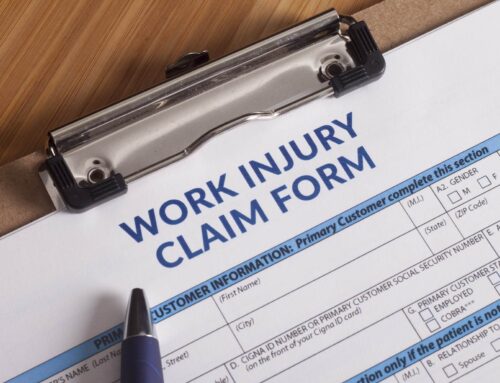By: Michael Brottman
While we all hope that the COVID-19 pandemic is nearing its end, the reality is that COVID-19 cases continue,
driven by the recent surge of the Omicron variant. Even if you have not personally been infected, we have all suffered from this pandemic. Lost opportunities for business, education, medical treatment, travel and leisure continue to affect us all.
By now, you have almost certainly heard news reports of “supply chain” problems. While we may not understand
all of the underlying causes of these problems, we can certainly see and feel the results of them. From waiting longer to receive, paying more for, or being unable to obtain the goods and services we want or need, the pandemic has affected our lives in many ways. Unfortunately, we will likely continue to feel the repercussions of COVID-19, long after the pandemic ends.
Governor Murphy recently assigned 150 members of the New Jersey National Guard to assist long-term care facilities and ensure the health and safety of their patients. It is easy to understand the effect that staffing and supply shortages have upon physicians and other medical providers. What may not be as easy to understand is the way that these problems can indirectly affect our lives.
If you have suffered a traumatic injury due to a motor vehicle accident or an accident at work you will probably be able to get the emergency medical treatment you need. However, delays in follow up, or other non-emergency medical care may result due to unanticipated, tangential effects of the COVID-19 pandemic. While these effects may be unforeseen, they do have a very real impact on both the care you receive and your body’s ability to maximize its recovery from the trauma.
In orthopedic medicine, these delays can be particularly costly. In 2020, the Hospital for Special Surgery published an article that found that delaying rotator cuff surgery for 12 months or longer may double your chances of needing a revision surgery. This is only one example of the detrimental effect a delay in receiving medical care can have on us. While we could devote our entire newsletter to discussing this topic, our focus here is what we can do to avoid unnecessary delays and maximize our recovery.
If you have never suffered a work injury, you may not know that the New Jersey Workers’ Compensation Act allows your employer, or more likely its workers’
compensation insurance carrier, to control your medical treatment. Shocking as that may seem, it is true; you do not get to select the doctor that treats you or schedule your own appointments. Consequently, unless you retain an experienced attorney, you may experience significant delays in getting the medical treatment you need. If your employer or its workers’ compensation insurance carrier contests your claim, it can delay treatment even longer. Many individuals who have been unfortunate enough to suffer an injury at work know this all too well. Some may even regret waiting as long as they did to consult an attorney.
What can we do to minimize these delays and their impact upon our recovery? Consult an attorney right away, even if you do not want to retain them immediately. If you think that you are unable to afford to speak to an attorney, think again. In New Jersey, it is unlawful for an attorney to charge clients a fee for representing them in connection with a workers’ compensation claim. An attorney who represents an injured worker in New Jersey Workers’ Compensation Courts may only receive a fee if they obtain benefits for their clients, and a Workers’ Compensation Judge determines the amount of the fee.
Although some attorneys do require workers’ compensation clients to pay for costs associated with obtaining medical records or evaluations in advance, the more common practice is for the attorney to advance these costs and recover them from the client’s recovery at the conclusion of the case. Even if your injury happened outside of work, most personal injury attorneys in New Jersey will not charge a fee for an initial consultation.
In addition to waiting longer to schedule a necessary medical appointment, in some instances the pandemic has also caused significant delays in obtaining medical records from doctors and hospitals. As a result, legal proceedings that rely upon these records as evidence may be adjourned until after the records become available. Even if your legal matter does not involve a traumatic injury, your attorney may need to obtain medical records as evidence to prove your case. Medical records are frequently used as evidence in matrimonial, child custody and other types of litigation. For all of these reasons, consulting with an attorney as soon as possible has never been more important.
There are things that you can do to help expedite the process. The New Jersey Patient Bill of Rights requires doctors and hospitals to provide patients with copies of their medical records within 30 days of receiving a written request from the patient or their authorized representative. Medical providers may charge patients a reasonable fee for copying the records. If your doctor or hospital fails to provide you with a copy of your records after making a written request for them, you can contact the New Jersey Department of Health’s Complaint hotline: (800) 792-9770; or write to them at: New Jersey Department of Health,
Division of Health Facilities Evaluation & Licensing, PO Box 367, Trenton, NJ 08625-0367.
If you have tested positive for COVID-19 and believe that your infection resulted from exposure to a co-worker or other individual while in the course of your employment, you should consult an attorney as soon as possible to understand your legal rights.
Michael D. Brottman is a workers compensation attorney and partner in the Lawrenceville, NJ law firm of Szaferman, Lakind. He can be reached at 609-275-0400 or via email at mbrottman@szaferman.com.
For more COVID-19 related resources and articles visit our COVID-19 Resource Center.
The foregoing is intended for general information purposes and is no substitute for specific legal advice.
References/Citations
Delaying Rotator Cuff Surgery May Increase Need For Revision (hss.edu)
Department of Health | Health Care Quality Assessment | Your Rights As A Patient (nj.gov)
NJ Division of Consumer Affairs – State Board of Medical Examiners (njconsumeraffairs.gov)






